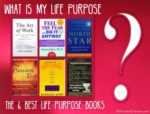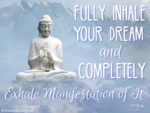Last updated on November 15th, 2019 at 12:36 am
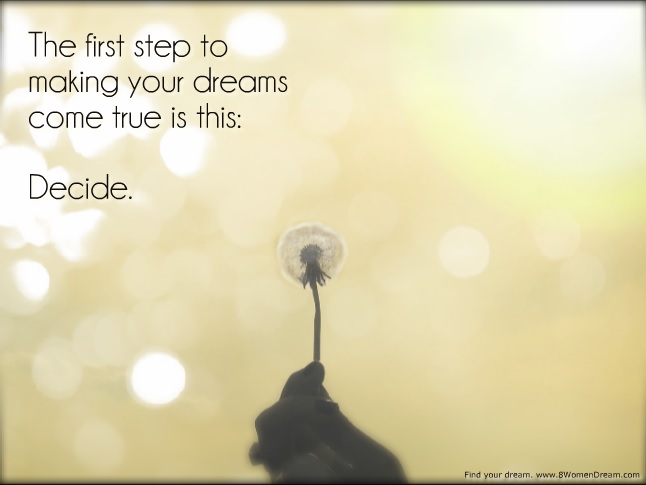 If you are like many dreamers, you have probably don’t know what to do that will make you happy.
If you are like many dreamers, you have probably don’t know what to do that will make you happy.
Some dreamers have many big dreams, so the idea of picking just one seems impossible, while others have no idea what it is they want to do with their lives.
In both cases, these dreamers put off taking any formal action at all.
You tell yourself, “I know I should do something else,” but you seem to come up with a million reasons (or tail-enders) for not attempting to find your dream and live your purpose.
Then you put yourself down for not being like other people who successfully achieve their dreams and are doing what they love to do.
Then the cycle starts again —
“I wish I knew what my life purpose,”
“I have so many big dreams that I can’t choose,”
“It’s too hard to know what I want to do,” or
“I just don’t feel like I can find my life purpose at this time.”
How do you find your big dream and live your life’s purpose?
Find Your Life’s Passion in 5 Steps
1. Get out 3 sheets of blank paper.
2. Write 0 – 10 on the top of one sheet of paper, 11 – 20 on the top of the 2nd sheet of paper, and 21 – 50 (or replace the number 50 with whatever your age is today) on the third sheet of paper.
3. Place a giant T on all three sheets–dividing each sheet into two columns.
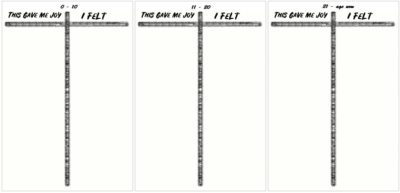
4. On the left column header write This Gave Me Joy and on the right column write I Felt.
5. Then sit somewhere you won’t be disturbed and list all the things you loved doing throughout your life and how they made you feel.
I walk you through this exercise and more in my ebook, Find Your Dream, but I promise you if you do just the 5 steps outlined above you will become more aware of what you need to bring back into your life and what dream is calling out to you.
You’ll begin to see a pattern in the things you enjoy spending time doing and how they made you feel. The feeling part is often the most misinterpreted part of discovering your passion. For example, when I do the T-sheet passion exercise, bike riding comes up in every age group. But I don’t want to be a professional bike rider or own a bike shop. How did bike riding make me feel? Free. I feel free when I ride a bike. Freedom is a feeling that comes up for me over and over. I realize to be happy; my passion has to allow me the freedom to travel, to explore–to feel free.
Writing is a form of freedom of expression. It takes me on a journey–just like riding a bike makes me feel. Do you see where I am going with this exercise?
Remember what makes you happy–but focus on WHY it makes you happy.
Dream Big Resistance
Sometimes when you narrow down your passion–what you might want to go after in a big way, resistance will suddenly appear, and this is usually a sign you are on the right track
Best-selling author, Steven Pressfield, says:
“…the more fear we feel about a specific enterprise, the more certain we can be that that enterprise is important to us and the growth of our soul. That’s why we feel so much resistance. If it meant nothing to us, there’d be no resistance.”
Resistance is the flashlight shining on what you are being called to do.
In the practice of mind-over-matter emotional freedom techniques, “resistance” is referred to as “tail-enders.” They are the “Yes, but” that show up when you begin to explore something your subconscious is pushing you to try.
Resistance shows up as:
“Wow. I’d like to go back to college and take a creative writing class and publish some short stores…”
The “Yes, but” or “tail-ender” that may show up:
“BUT when will I have the time?”
“BUT how will I pay for it? I don’t have the money right now!”
“BUT what if I don’t like it?”
“BUT what if I fail?”
“BUT no one my age is doing that!”
Unfortunately, too many people listen to the words of the resistance “buts” by giving up instead of saying:
“Even though I think I don’t have the time to go to college, I am going to make an appointment with a college counselor and talk about this fear because I deserve this dream.”
When you see resistance coming up as you narrow in on your dream with whispers of “But this is stupid!” or “But I can’t do this!” take a piece of paper and write them down on one side of the paper and try to remember if these whispers aren’t fears put on your when you were much younger.
Maybe you have an older sibling who used to tell you that what you imagined “was stupid.” Or perhaps a parent or a teacher made you feel like you couldn’t do certain things. Looking back, you see what people were negatively saying to you was their naysaying opinions of themselves that they were projecting on to you.
All too often your fears arise from negative past experiences when you were young and impressionable, and someone hurt you deeply by what they said or did to crush your spirit. Throughout the subsequent years, the world seemed to show up enough times to support what someone made you feel about your abilities. If this happens enough times, you will subconsciously begin to believe what you were told or made to feel is your truth in the present moment.
It’s like someone saying you are a terrible athlete when you are a 13-year-old trying baseball for the first time, then afterward, every time you try a new sport you make all kinds of mistakes. You begin to believe that you must not be athletic, so you stop trying any physical activity that seems sporty. Later in life as an adult, you decide to try your hand at swimming because you want to be able to swim with your kids and you get a swimming instructor who believes in you. Through practice and hard work on your mistakes without quitting you find that you are a good swimmer.
You discover that you really can be athletic.
What was said to you as a kid was a lie.
When you see the dream resistance “buts” coming up, practice telling yourself positive statements like:
“Even though putting on a swimsuit makes me feel foolish, I am going to learn to swim anyway because I deserve this dream to swim in a triathlon.”
“Even though I haven’t written anything in 20 years and I feel like I am a bad writer, I am going to sign up and attend the first night of that creative writing class because I am a good person and I deserve to take a chance on myself.”
“Even though my family always told me that I’m terrible with money, I am going to set aside $10.00 a month for my travel dream to Ireland and not touch the money until I have enough to take my dream trip because I am a kind and loving person and I am going to be kind and loving to myself.”
Don’t ignore the resistance “buts” appearing when you are honing in on what you would love to do for your passion, instead, take it as a sign that you are on the right track.
Write your resistance “buts” down and create positive statements around them:
“Even though I feel [state resistance “but”], I choose [state what you are going to do for yourself and why you deserve it].”
Then trust that you do deserve to find your dream and live your life’s purpose.
Catherine Hughes
 |  |  |  |
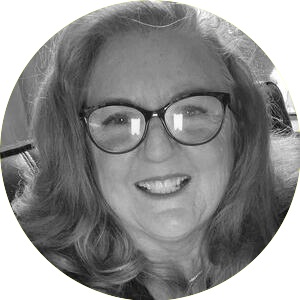
Catherine Hughes is an accomplished magazine columnist, content creator, and published writer with a background as an award-winning mom blogger. She partners with companies to create captivating web content and social media stories and writes compelling human interest pieces for both small and large print publications. Her writing, which celebrates the resilience and achievements of Northern California’s residents, is featured in several magazines. Beyond her professional life, Catherine is passionate about motherhood, her son, close friendships, rugby, and her love for animals.
Note: Articles by Catherine may contain affiliate links and may be compensated if you make a purchase after clicking on an affiliate link.
